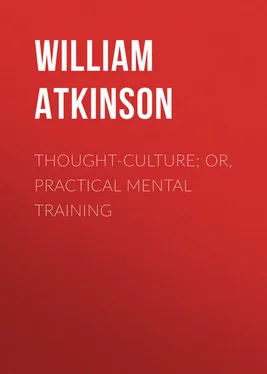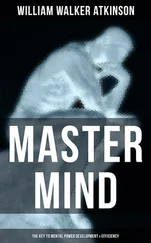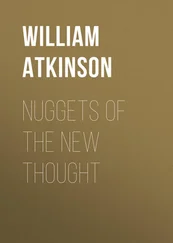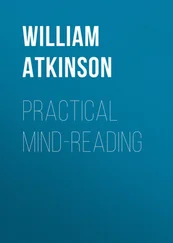William Atkinson - Thought-Culture; Or, Practical Mental Training
Здесь есть возможность читать онлайн «William Atkinson - Thought-Culture; Or, Practical Mental Training» — ознакомительный отрывок электронной книги совершенно бесплатно, а после прочтения отрывка купить полную версию. В некоторых случаях можно слушать аудио, скачать через торрент в формате fb2 и присутствует краткое содержание. ISBN: , Жанр: foreign_antique, foreign_prose, на английском языке. Описание произведения, (предисловие) а так же отзывы посетителей доступны на портале библиотеки ЛибКат.
- Название:Thought-Culture; Or, Practical Mental Training
- Автор:
- Жанр:
- Год:неизвестен
- ISBN:http://www.gutenberg.org/ebooks/41519
- Рейтинг книги:4 / 5. Голосов: 1
-
Избранное:Добавить в избранное
- Отзывы:
-
Ваша оценка:
- 80
- 1
- 2
- 3
- 4
- 5
Thought-Culture; Or, Practical Mental Training: краткое содержание, описание и аннотация
Предлагаем к чтению аннотацию, описание, краткое содержание или предисловие (зависит от того, что написал сам автор книги «Thought-Culture; Or, Practical Mental Training»). Если вы не нашли необходимую информацию о книге — напишите в комментариях, мы постараемся отыскать её.
Thought-Culture; Or, Practical Mental Training — читать онлайн ознакомительный отрывок
Ниже представлен текст книги, разбитый по страницам. Система сохранения места последней прочитанной страницы, позволяет с удобством читать онлайн бесплатно книгу «Thought-Culture; Or, Practical Mental Training», без необходимости каждый раз заново искать на чём Вы остановились. Поставьте закладку, и сможете в любой момент перейти на страницу, на которой закончили чтение.
Интервал:
Закладка:
William Walker Atkinson
Thought-Culture; Or, Practical Mental Training
CHAPTER I
THE POWER OF THOUGHT
In other volumes of this series we have considered the operations of the human mind known as Will, Memory, etc. We now approach the consideration of those mental activities which are concerned with the phenomena of thought – those activities which we generally speak of as the operation of the intellect or reason.
What is thought? The answer is not an easy one, although we use the term familiarly almost every hour of our waking existence. The dictionaries define the term "Thought" as follows: "The act of thinking; the exercise of the mind in any way except sense and perception; serious consideration; deliberation; reflection; the power or faculty of thinking; the mental faculty of the mind; etc." This drives us back upon the term, "to think" which is defined as follows: "To occupy the mind on some subject; to have ideas; to revolve ideas in the mind; to cogitate; to reason; to exercise the power of thought; to have a succession of ideas or mental states; to perform any mental operation, whether of apprehension, judgment, or illation; to judge; to form a conclusion, to determine; etc."
Thought is an operation of the intellect. The intellect is: "that faculty of the human soul or mind by which it receives or comprehends the ideas communicated to it by the senses or by perception, or other means, as distinguished from the power to feel and to will; the power or faculty to perceive objects in their relations; the power to judge and comprehend; also the capacity for higher forms of knowledge as distinguished from the power to perceive and imagine."
When we say what we "think," we mean that we exercise the faculties whereby we compare and contrast certain things with other things, observing and noting their points of difference and agreement, then classifying them in accordance with these observed agreements and differences. In thinking we tend to classify the multitude of impressions received from the outside world, arranging thousands of objects into one general class, and other thousands into other general classes, and then sub-dividing these classes, until finally we have found mental pigeon-holes for every conceivable idea or impression. We then begin to make inferences and deductions regarding these ideas or impressions, working from the known to the unknown, from particulars to generalities, or from generalities to particulars, as the case may be.
It is this faculty or power of thought – this use of the intellect, that has brought man to his present high position in the world of living things. In his early days, man was a much weaker animal than those with whom he was brought into contact. The tigers, lions, bears, mammoths, and other ferocious beasts were much stronger, fiercer, and fleeter than man, and he was placed in a position so lacking of apparent equal chance of survival, that an observer would have unhesitatingly advanced the opinion that this weak, feeble, slow animal must soon surely perish in the struggle for existence, and that the "survival of the fittest" would soon cause him to vanish from the scene of the world's activities. And, so it would have been had he possessed no equipment other than those of the other animals; viz., strength, natural weapons and speed. And yet man not only survived in spite of these disadvantages, but he has actually conquered, mastered and enslaved these other animals which seemed likely to work his destruction. Why? How?
This feeble animal called man had within him the elements of a new power – a power manifested in but a slight degree in the other animals. He possessed an intellect by which he was able to deduce, compare, infer – reason.
His lack of natural weapons he overcame by borrowing the idea of the tooth and claw of the other animals, imitating them in flint and shaping them into spears; borrowing the trunk of the elephant and the paw of the tiger, and reproducing their blow-striking qualities in his wooden club. Not only this but he took lessons from the supple limbs and branches of the trees, and copied the principle in his bow, in order to project its minature spear, his arrow. He sheltered himself, his mate and his young, from the fury of the storm, first by caves and afterwards by rude houses, built in inaccessible places, reached only by means of crude ladders, bridges, or climbing poles. He built doors for his habitations, to protect himself from the attacks of these wild enemies – he heaped stones at the mouth of his caves to keep them out. He placed great boulders on cliffs that he might topple them down on the approaching foe. He learned to hurl rocks with sure aim with his strong arm. He copied the floating log, and built his first rude rafts, and then evolved the hollowed canoe. He used the skins of animals to keep him warm – their tendons for his bowstrings. He learned the advantages of cooperation and combined effort, and thus formed the first rudiments of society and social life. And finally – man's first great discovery – he found the art of fire making.
As a writer has said: "For some hundreds of years, upon the general plane of self-consciousness, an ascent, to the human eye gradual but from the point of view of cosmic evolution rapid, has been made. In a race large-brained, walking-erect, gregarious, brutal, but king of all other brutes, man in appearance but not in fact, was from the highest simple-consciousness born the basic human faculty, self-consciousness and its twin, language. From these and what went with these, through suffering, toil and war; through bestiality, savagery, barbarism; through slavery, greed, effort, through conquests infinite, through defeats overwhelming, through struggle unending; through ages of aimless semi-brutal existence, through subsistence on berries and roots; through the use of the casually found stone or stick; through life in deep forests, with nuts and seeds, and on the shores of waters with mollusks, crustaceans and fish for food; through that greatest, perhaps, of human victories, the domestication and subjugation of fire; through the invention and art of bow and arrow; through the training of animals and the breaking of them to labor; through the long learning which led to the cultivation of the soil; through the adobe brick and the building of houses therefrom; through the smelting of metals and the slow birth of the arts which rest upon these; through the slow making of alphabets and the evolution of the written work; in short, through thousands of centuries of human life, of human aspiration, of human growth, sprang the world of men and women as it stands before us and within us today with all its achievements and possessions."
The great difference between thought as we find it in man, and its forms among the lower animals lies in what psychologists have called "progressive thought." The animals advance but little in their thinking processes but rest content with those of their ancestors – their thought seems to have become set or crystallized during the process of their evolution. The birds, mammals and the insects vary but little in their mental processes from their ancestors of many thousand years ago. They build their nests, or dens, in almost precisely the same manner as did their progenitors in the stone-age. But man has slowly but steadily progressed, in spite of temporary set-backs and failures. He has endeavored to progress and improve. Those tribes which fell back in regard to mental progress and advancement, have been left behind in the race, and in many cases have become extinct. The great natural law of the "survival of the fittest" has steadily operated in the life of the race. The "fittest" were those best adapted to grapple with and overcome the obstacles of their environment, and these obstacles were best overcome by the use of the intellect. Those tribes and those individuals whose intellect was active, tended to survive where others perished, and consequently they were able to transmit their intellectual quality to their descendants.
Читать дальшеИнтервал:
Закладка:
Похожие книги на «Thought-Culture; Or, Practical Mental Training»
Представляем Вашему вниманию похожие книги на «Thought-Culture; Or, Practical Mental Training» списком для выбора. Мы отобрали схожую по названию и смыслу литературу в надежде предоставить читателям больше вариантов отыскать новые, интересные, ещё непрочитанные произведения.
Обсуждение, отзывы о книге «Thought-Culture; Or, Practical Mental Training» и просто собственные мнения читателей. Оставьте ваши комментарии, напишите, что Вы думаете о произведении, его смысле или главных героях. Укажите что конкретно понравилось, а что нет, и почему Вы так считаете.












